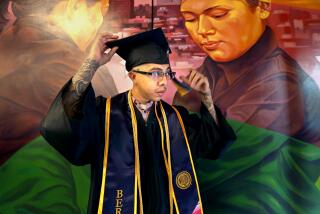Shadow of the Wolf
The past of Ricardo Resendez follows him through life like the shadow of a wolf.
He feels it behind him most of the day, and at night, the worst time, it crouches at the edge of his memory, red eyes staring through the darkness.
“It won’t go away,” he says in anguish as we talk across a restaurant table, where even the clatter of dishes and forks brings the wolf closer in flashing images.
Medication meant to dull his pain works sometimes, and booze will get him through a few hours. But after everything wears off there are always the terrible memories, always the shadow of the wolf.
That’s understandable. Twenty-five years in one of the most brutal prisons in America is hard to get over.
Resendez got there by killing a man in 1961. He was a soldier stationed at Ft. Bragg, N.C., when a stranger attacked a friend with a knife.
He intervened and the stranger went after him. As he would recall later, “something snapped.” Resendez drew his own knife, and after a violent scuffle, the stranger lay dead.
Ironically, Resendez had been urged by his mother to join the Army in the first place to escape the gang-ridden environment of his own East L.A. neighborhood.
And now, at age 18, he faced a quarter-century behind bars in a North Carolina state prison. It was where the wolf was born.
*
I first met Resendez shortly after he had been released from prison. He was living with a woman he loved dearly and talking to gang members about his own life, telling them: “Don’t be a fool, don’t be like me.”
He was trying hard to overcome his past and, with an IQ measured in prison at 142, he was doing all right. L.A.’s Department of Water and Power had hired him as a laborer, but everyone figured he’d climb higher soon.
But then the wolf cast its shadow.
“I’d be eating or driving or just doing nothing,” he says, “and suddenly remember a guy in prison who’d been doused with paint and set on fire. I’d hear the screams and smell the burning flesh.
“It would just pop into my head and I’d try to get it out, but it would come back again and again. . . .”
That was only one of the memories. The wolf throws a long shadow. Without closing his eyes, Resendez can see a body hurtling through space from the fifth tier of the prison and hear it splat on hard concrete.
He sees the gore of its impact and covers his face with his hands, shutting it out . . . but only for a little while.
A psychologist describes his condition as post-traumatic stress, the same emotional affliction that affects veterans of war.
Resendez calls it a living nightmare.
The flashes of memory altered his behavior. He became morose and angry. He lost the love of his life and then his job, and spent two terrifying weeks in jail on a parole violation.
It was later determined that the violation had never occurred, but by then Resendez’s life was in a tailspin from which it has never recovered.
*
When I met with him the other day, it was clear the shadow of the wolf continued to lie over him. Even the normal din of a restaurant was too much. It reminded him of prison. He had to leave and stand in the open to calm his anxieties.
Three drunk-driving arrests had cost him his last job. An attempt at group therapy went awry when he began talking about his life behind bars. It so frightened others in the group that the leader asked him to leave.
“It’s hard to get over the past,” Resendez says. “I can’t even get mad without someone thinking I’m going to commit murder.”
After five months in the county jail on the drunk-driving convictions, Resendez wandered through the Southwest and Mexico, then returned, realizing at last that he couldn’t escape the shadows. So he lives with them.
Now 51, he survives on $600 a month from Social Security. Until recently, he has lived with his mother in Boyle Heights, but when I saw him he was in the middle of moving into a room on the edge of Skid Row.
The medication he takes helps only marginally to relieve him of his nightmares. Eight or 10 beers, he says, help a lot more. He’s taking a correspondence course on animal care, and hopes that will end up getting him a good job. He loves animals and identifies with strays.
“If I could,” he says, “I’d help all the innocent creatures of the world to quit hurting . . . because I know what it’s like to hurt.”
I see him wince at the clatter in the restaurant and watch him hurry to the door and leave. He stands alone in the muted sunlight, a pained and lonely figure, smoking a cigarette and listening to the distant, persistent howling of the wolf.
More to Read
Sign up for Essential California
The most important California stories and recommendations in your inbox every morning.
You may occasionally receive promotional content from the Los Angeles Times.










